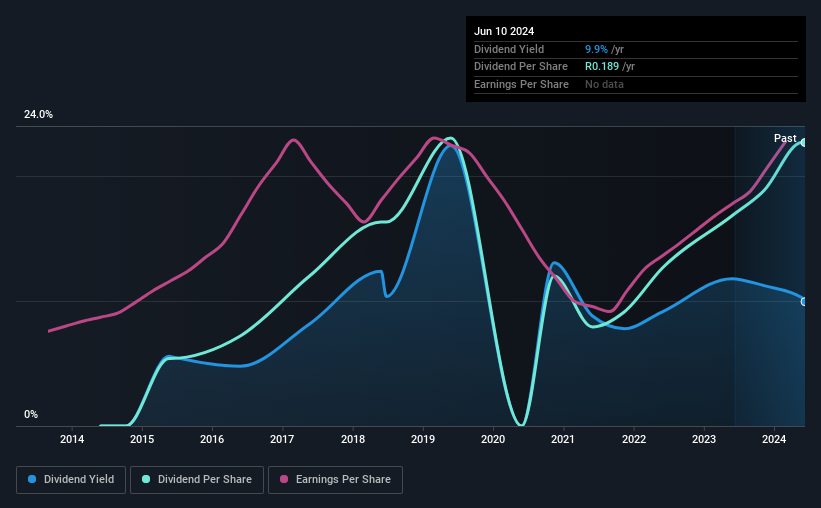- South Africa
- /
- Software
- /
- JSE:ISA
ISA Holdings' (JSE:ISA) Upcoming Dividend Will Be Larger Than Last Year's
ISA Holdings Limited (JSE:ISA) will increase its dividend from last year's comparable payment on the 22nd of July to ZAR0.112. This will take the dividend yield to an attractive 9.9%, providing a nice boost to shareholder returns.
While the dividend yield is important for income investors, it is also important to consider any large share price moves, as this will generally outweigh any gains from distributions. Investors will be pleased to see that ISA Holdings' stock price has increased by 30% in the last 3 months, which is good for shareholders and can also explain a decrease in the dividend yield.
View our latest analysis for ISA Holdings
ISA Holdings Is Paying Out More Than It Is Earning
We like to see robust dividend yields, but that doesn't matter if the payment isn't sustainable. Prior to this announcement, the company was paying out 100% of what it was earning. Without profits and cash flows increasing, it would be difficult for the company to continue paying the dividend at this level.
If the company can't turn things around, EPS could fall by 0.3% over the next year. If the dividend continues along the path it has been on recently, the payout ratio in 12 months could be 106%, which is definitely a bit high to be sustainable going forward.

ISA Holdings' Dividend Has Lacked Consistency
It's comforting to see that ISA Holdings has been paying a dividend for a number of years now, however it has been cut at least once in that time. Due to this, we are a little bit cautious about the dividend consistency over a full economic cycle. Since 2015, the dividend has gone from ZAR0.045 total annually to ZAR0.189. This implies that the company grew its distributions at a yearly rate of about 17% over that duration. Despite the rapid growth in the dividend over the past number of years, we have seen the payments go down the past as well, so that makes us cautious.
Dividend Growth May Be Hard To Achieve
Given that the dividend has been cut in the past, we need to check if earnings are growing and if that might lead to stronger dividends in the future. However, ISA Holdings' EPS was effectively flat over the past five years, which could stop the company from paying more every year.
ISA Holdings' Dividend Doesn't Look Great
In conclusion, we have some concerns about this dividend, even though it being raised is good. The company seems to be stretching itself a bit to make such big payments, but it doesn't appear they can be consistent over time. Overall, the dividend is not reliable enough to make this a good income stock.
Investors generally tend to favour companies with a consistent, stable dividend policy as opposed to those operating an irregular one. Meanwhile, despite the importance of dividend payments, they are not the only factors our readers should know when assessing a company. Case in point: We've spotted 5 warning signs for ISA Holdings (of which 4 don't sit too well with us!) you should know about. Looking for more high-yielding dividend ideas? Try our collection of strong dividend payers.
New: AI Stock Screener & Alerts
Our new AI Stock Screener scans the market every day to uncover opportunities.
• Dividend Powerhouses (3%+ Yield)
• Undervalued Small Caps with Insider Buying
• High growth Tech and AI Companies
Or build your own from over 50 metrics.
Have feedback on this article? Concerned about the content? Get in touch with us directly. Alternatively, email editorial-team (at) simplywallst.com.
This article by Simply Wall St is general in nature. We provide commentary based on historical data and analyst forecasts only using an unbiased methodology and our articles are not intended to be financial advice. It does not constitute a recommendation to buy or sell any stock, and does not take account of your objectives, or your financial situation. We aim to bring you long-term focused analysis driven by fundamental data. Note that our analysis may not factor in the latest price-sensitive company announcements or qualitative material. Simply Wall St has no position in any stocks mentioned.
About JSE:ISA
ISA Holdings
An investment holding company, provides network, internet, and information security solutions to the sub-Saharan Africa market.
Flawless balance sheet with slight risk.
Market Insights
Community Narratives



